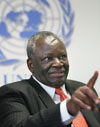
In times of delicate political negotiations and fragile ceasefires, diplomats have to tread a fine rhetorical line. But even allowing for the usual excess of diplomatic optimism, some of the recent comments by the new UNAMID chief, Ibrahim Gambari, put a remarkably rosy spin on the situation in Darfur.
As western Darfur was coping with the aftermath of a large government offensive that killed hundreds and displaced between 45,000-100,000 civilians, and with the U.N. and humanitarian aid agencies alike both unable to gain access to the Jebel Marra region, Gambari issued this rather bright assessment of UNAMID’s capacity:
On the part of UNAMID, we are now currently sufficiently deployed to be able to carry out activities directly related to its core mandate, which includes, but is not limited to: the protection of civilians; support for the implementation of peace agreements including monitoring violations of ceasefire agreements and respect for human rights of the population; and support for humanitarian assistance, as well as early recovery and development programmes.
A week later, Gambari said that he expected elections in Darfur to go smoothly and didn’t think security would be a “major concern” – a conclusion sharply at odds with the elections reporting from Human Rights Watch, the Carter Center, and almost everyone else.
While the fighting in Jebel Marra has died down, there were unverified reports on Monday that Darfuri rebels reportedly shot down two government helicopters in the area, and fighting between the Misseriya and Nuwayba tribes continues in the region just south of Jebel Marra.
While it might be less diplomatic, Gambari should perhaps try speaking truth to power. UNAMID remains ineffective in implementing the key components of its mandate: unable to protect civilians; unable to move freely; unable to monitor violations of ceasefires on the ground in real time; and unable to ensure that aid is delivered. According to an OCHA situation update, neither the U.N. nor humanitarian organizations were able to access civilians affected by the fighting in Jebel Marra a full week after the offensives had begun. Until access was guaranteed, the update said, “assessments of needs and delivery of assistance remain on hold.” And once peacekeepers did venture into the area, they found themselves unable even to defend themselves. On March 5, a UNAMID assessment patrol meant to investigate the situation in Jebel Marra was ambushed by unidentified gunmen. An egregious (and embarrassing) number of peacekeepers, 40, were abducted and released the next day, stripped of vehicles and equipment. To date, UNAMID has yet to verify or report on the humanitarian or security situation on the ground in Jebel Marra.
UNAMID faces the obvious dilemma of having to depend on the cooperation of the Sudanese government – a main perpetrator of violence – to fulfill its mandate. But as Darfur’s peacekeeping chief, Gambari has the responsibility to report the weaknesses of the Mission clearly to the Security Council and make clear that such embarrassing shortcomings not only endanger Darfuris but undercut the credibility of the United Nations on the global stage.
Photo: U.N. peacekeeping chief Ibrahim Gambari (AP)

